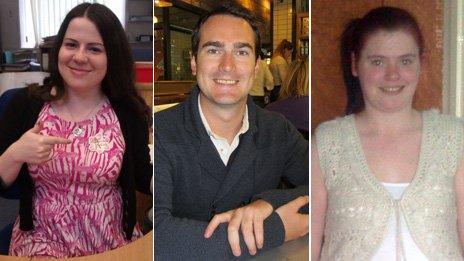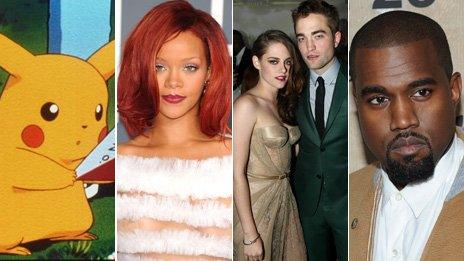Photosensitive epilepsy: Young people on how they cope
- Published

Jane Williams, Oliver Spicer and Stephanie McMaster all have different experiences of growing up with photosensitive epilepsy.
"Viewers are warned that the following programme contains flash photography."
It's a message we hear repeatedly, but these flashing images don't just occur on TV - they are appearing in a growing number of video games, films, music videos and on YouTube. So what is it really like living with photosensitive epilepsy?
Photosensitive epilepsy itself is quite rare; only about three in every 100 people with epilepsy have this type.
Jane Williams, 24, from Glasgow, was diagnosed at the age of 12. She says she was mollycoddled growing up.
"Teachers treated me a bit like a china doll when I was at school. They were worried about me taking seizures so I wasn't pushed that much. I could get out of PE quite easily but I think the teachers should have maybe made me do a bit more," she said.
It was only when Jane turned 18 and headed off to university that she began to notice her epilepsy have more of an impact.
"When I got to university I wanted to go to bars and nightclubs.
"For me though, a night out can be a bit of an ordeal. I have to be very careful about strobe lights and it requires a lot of planning."
She explained how she would have to phone nightclubs in advance to find out what type of lighting they used.
'One-eyed dance'
"Some nightclub owners just don't understand what it's like trying to plan your night out. Bouncers are a particular bugbear of mine. In one bar in Glasgow, a bouncer told me if I had epilepsy I shouldn't be allowed out.
"I was furious - there are so many misunderstandings."
Jane has since worked out ways to manage her epilepsy when she is in a nightclub through the "one-eyed dance".
"My neurologist told me that both eyes have to see the light for you to have a seizure so if a light comes on and I'm not expecting it, I cover one eye with the palm of my hand, look down and keep dancing. My friends now know what that means and they all do the same."
Charity Epilepsy Action says this method can be used to hold off a seizure.
Jane, who is now working for a publishing house, said that even though she could manage her epilepsy, she constantly worried when she was in a bar.
"I'm in constant fear that strobe lights might come on. I'm constantly thinking about my escape route and have even had panic attacks when lights have come on."

Flashing lights in an episode of Pokemon, videos by Kanye West and Rihanna and the movie Twilight have all caused concerns. (Photo credits: PA/Getty)
It's not just nightclubs that can trigger photosensitive epilepsy seizures. Films and music videos can also act as a trigger for some.
In 1997, an episode of Pokémon shown on Japanese TV caused almost 600 people to have seizures. Three-quarters of those had no past history of epilepsy.
For Oliver Spicer, 23, from Portsmouth, it was an Xbox game that was one of his initial triggers. Oliver was diagnosed with photosensitive epilepsy after a night out while he was studying at the University of Sheffield.
"I had been out for the night, had been drinking, and was tired. When I came home I had a seizure. I was 19 when it was diagnosed and I found it really hard initially.
"I became a bit depressed and thought I would never be able to hold down a job. Sleep deprivation is one of the main triggers of a seizure and I was worried about that," he said.
However, over time Oliver was able to control his epilepsy by monitoring his sleep patterns and medication. He has now graduated and is a consultant for a large accounting firm.
"Most people think epilepsy ruins your nightlife or stops you pursuing things you care about but it didn't ruin mine. I played in a ska band with friends at university, I enjoy a great deal of support from my partner, family and friends and I am treated very well by my employer. In short, I live a normal and happy life regardless of having epilepsy."
'Physically attacked'
But Epilepsy Action believes many people living with epilepsy are still discriminated against.
Stephanie McMaster, 21, from Belfast was the victim of bullying when she was at school.
"I was physically attacked for being different. The other kids threw stuff at my head on the bus, thinking it would make me have a seizure and they thought it would be funny to see.
"The teachers turned a blind eye because they didn't understand either. I was constantly called names and left out. It's made me shy to this day."
Stephanie has recently had a baby and is now discovering the pitfalls of being a mother and living with epilepsy.
"My daughter is 16 weeks old. It can be quite hard, I'm not allowed to bathe her on my own in case I have a seizure or be left on my own with her. If I want to go up to the shop I need to get someone to come with me.
"My message to those reading this is look at me now; I have my own life, my own house, my own family. I turned out to be a successful person. People need to understand what it's like living with epilepsy and realise it's not a death sentence."
- Published21 November 2012
- Published12 November 2012
- Published28 September 2012
- Published5 June 2012